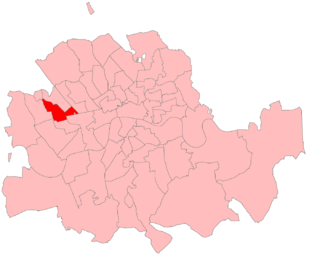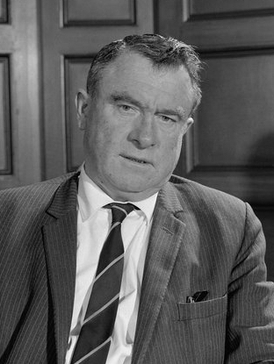Related Research Articles

Dennis Christopher George Potter was an English television dramatist, screenwriter and journalist. He is best known for his BBC television serials Pennies from Heaven (1978) and The Singing Detective (1986) as well as the BBC television plays Blue Remembered Hills (1979) and Brimstone and Treacle (1976). His television dramas mixed fantasy and reality, the personal and the social, and often used themes and images from popular culture. Potter is widely regarded as one of the most influential and innovative dramatists to have worked in British television.
Colin Burgon is a British Labour Party politician who was the Member of Parliament (MP) for Elmet from 1997 to 2010.

Christopher Paul Farrelly is a British Labour Party politician, banker and journalist, who was the Member of Parliament (MP) for Newcastle-under-Lyme from 2001 to 2019.

Canvassing, also known as door knocking or phone banking, is the systematic initiation of direct contact with individuals, commonly used during political campaigns. Canvassing can be done for many reasons: political campaigning, grassroots fundraising, community awareness, membership drives, and more. Campaigners knock on doors to contact people personally. Canvassing is used by political parties and issue groups to identify supporters, persuade the undecided, and add voters to the voters list through voter registration, and it is central to get out the vote operations. It is the core element of what political campaigns call the ground game or field.

The Wednesday Play is an anthology series of British television plays which ran on BBC1 for six seasons from October 1964 to May 1970. The plays were usually original works written for television, although dramatic adaptations of fiction also featured. The series gained a reputation for presenting contemporary social dramas, and for bringing issues to the attention of a mass audience that would not otherwise have been discussed on screen.

Sir Anthony John Charles Meyer, 3rd Baronet was a British soldier, diplomat, and Conservative and later Liberal Democrat politician, best known for standing against Margaret Thatcher for the party leadership in 1989. In spite of his staunch conservative views on economic policy, his passionate support of increased British integration into the European Union led to him becoming increasingly marginalised in Thatcher's Conservative Party.
Michael Carr is a British teacher, lecturer, and politician for the Liberal Democrats. Originally a teacher, Carr became active in politics as a Conservative councillor before joining the Social Democratic Party. After two unsuccessful general election candidacies, Carr won a sensational by-election victory in 1991 to become the Member of Parliament (MP) for Ribble Valley. His victory was short-lived as he lost the seat in the general election that followed a year later, and he twice failed to regain it.

Paddington South was a Parliamentary constituency in London which returned one Member of Parliament. It was a compact urban area, but predominantly wealthy, and was most famously represented by Lord Randolph Churchill during the latter part of his career.

Stephen Coughlan was an Irish Labour Party politician who served for sixteen years as Teachta Dála (TD) for the Limerick East constituency. During the 1930s and 40s he was a member of the Irish Republican Army but in the post-World War 2 period he moved into politics, first with the Republican Clann na Poblachta party and then later with the Labour Party. After becoming extremely politically powerful in his home of Limerick City, Coughlan was criticised as being an extremely parochial politician who jealously guarded his power base against any challenger, even those in his own party, which resulted in a number of local splits and rivalries that ultimately corroded his support. Politically and socially conservative, Coughlan was frequently at odds with the rest of the Labour party, while his "colourful" behaviour often drew national attention.
Henry Cassidy Midgley, PC (NI), known as Harry Midgley was a prominent trade-unionist and politician in Northern Ireland. Born to a working-class Protestant family in Tiger's Bay, north Belfast, he followed his father into the shipyard. After serving on the Western Front in the Great War, he became an official in a textile workers union and a leading light in the Belfast Labour Party (BLP). He represented the party's efforts in the early 1920s to provide a left opposition to the Unionist government of the new Northern Ireland while remaining non-committal on the divisive question of Irish partition.

Francis Nigel Forman was a British Conservative politician. After working in the Conservative Research Department from 1968 to 1976 he was elected as an MP. He became a junior minister, Minister of Higher Education, in April 1992, but resigned from that office after 8 months.
John Donkin Dormand, Baron Dormand of Easington was a British educationist and Labour Party politician from the coal mining area of Easington in County Durham, in the north-east of England. He was Member of Parliament (MP) for the Easington constituency from 1970 until his retirement in 1987.

Paul Andrew Nuttall is a British politician who served as Leader of the UK Independence Party (UKIP) from 2016 to 2017. He was elected to the European Parliament in 2009 as a UK Independence Party (UKIP) candidate, and served as a Member of the European Parliament (MEP) for North West England between 2009 and 2019, sitting in the Europe of Freedom and Direct Democracy group. He left UKIP in December 2018, criticising the party's association with far-right activist Tommy Robinson, and joined the Brexit Party in 2019.
The 1902 Cleveland by-election was a parliamentary by-election held for the British House of Commons constituency of Cleveland in the North Riding of Yorkshire on 5 November 1902.
Kenith Trodd is a British television producer best known for his professional association with television playwright Dennis Potter.

Sir Andrew William Barton was a British Liberal politician and businessman.

There was a by-election in the constituency of Stoke-on-Trent Central on 23 February 2017 following the resignation of Labour's Tristram Hunt, who became director of the Victoria and Albert Museum in London. It took place alongside a by-election in Copeland.

Anna Louise Lorck is a New Zealand politician of the Labour Party. She served in the New Zealand House of Representatives as the MP for Tukituki from 2020 to 2023.

Reform UK is a right-wing populist political party and registered private limited company in the United Kingdom. Founded in November 2018 as the Brexit Party, advocating a no-deal Brexit, it won the most seats at the 2019 European Parliament election in the UK, but did not win any seats at the 2019 general election. The UK withdrew from the European Union (EU) in January 2020. A year later, in January 2021, the party was renamed Reform UK. During the COVID-19 pandemic the party advocated against further lockdowns. Since 2022, it has campaigned on a broader platform, in particular pledging to reduce net migration, supporting low taxation, and opposing the government's net-zero energy policy. Following Nigel Farage's resumption of the party leadership in early June during the campaign for the 2024 general election, opinion pollsters and analysts reported a sharp increase in support for the party. In the election it gained five Members of Parliament (MPs) with the third highest popular vote at 4,114,287, and 14.3% of the vote share.

Festus Akinbusoye is a British Conservative Party politician who was the Bedfordshire Police and Crime Commissioner from 2021 to 2024. He was the first black Briton to serve as a Police and Crime Commissioner.
References
- 1 2 Angelini, Sergio (2003–14). "Stand Up, Nigel Barton (1965)". BFI Screenonline. Retrieved 25 August 2019.
- ↑ Cook, John R. (1998) [1995]. Dennis Potter: A Life on Screen. Manchester & New York City: Manchester University Press. pp. 11–12, 318 n.18. ISBN 9780719054235.
- ↑ Cook Dennis Potter: A Screen Life, p. 32, 321 n.26
- Humphrey Carpenter, Dennis Potter: A Biography; 1998
- Graham Fuller (Ed.), Potter on Potter; 1993
- W.S. Gilbert, Fight and Kick and Bite: The Life and Work of Dennis Potter; 1995
- Nigel Williams (Ed.), Arena: Painting the Clouds; 2005